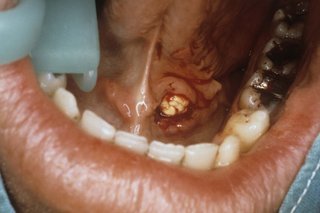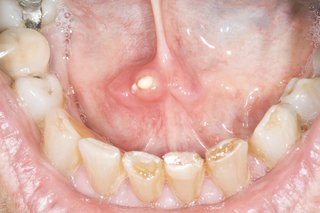Salivary gland stones
Salivary gland stones are small stones that form in salivary glands in your mouth and can block the flow of saliva (spit). They're not usually serious and you may be able to remove them yourself.
Symptoms of salivary gland stones
Most salivary gland stones form below your tongue in one of the glands supplying saliva to your mouth. You cannot always see them.

CLINICA CLAROS/SCIENCE PHOTO LIBRARY https://www.sciencephoto.com/media/643969/view

DR P. MARAZZI/SCIENCE PHOTO LIBRARY https://www.sciencephoto.com/media/81080/view
Salivary gland stones may cause:
- dull pain in your mouth that comes and goes
- swelling in your mouth that flares up from time to time
- an infection around the stone – signs of infection include pain, redness and a high temperature
If you feel intense pain during mealtimes, this could mean the stone is completely blocking a saliva gland. The pain usually lasts 1 to 2 hours.
Things you can do to try to remove salivary gland stones
You can try to remove a salivary gland stone by doing things to increase the amount of saliva in your mouth, such as:
- drinking plenty of water
- gently massaging around the stone
- chewing sugar-free gum or sucking on sugar-free sweets or lozenges
If you have pain and swelling, you can:
- take paracetamol or ibuprofen
- suck ice cubes or ice lollies
The symptoms will not go away until the stone has been removed.
Important
Do not use anything sharp to try to remove a salivary gland stone because it could cause injury and infection.
Non-urgent advice: See a GP if:
- you're unable to remove a salivary gland stone yourself
- the stone has caused an infection – signs include pain, redness or pus around the stone, and having a high temperature (or feeling hot, cold or shivery)
Treatments for salivary gland stones
Small salivary gland stones sometimes fall out on their own.
You’ll continue to have symptoms until the stone falls out or is removed.
A GP may attempt to gently remove the stone with a thin, blunt instrument.
If that's not possible, you may need to have the stone removed in hospital.
Causes of salivary gland stones
It's not clear what causes salivary gland stones, so there's no way to prevent them. They're not usually linked to other health problems.
Once removed, salivary gland stones do not usually come back. But if you keep getting them you might need to have 1 of your salivary glands removed.
Page last reviewed: 14 August 2023
Next review due: 14 August 2026